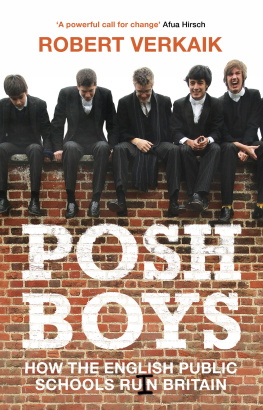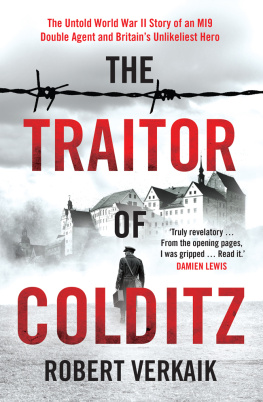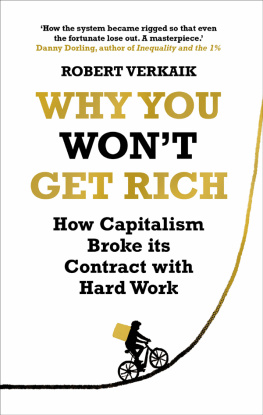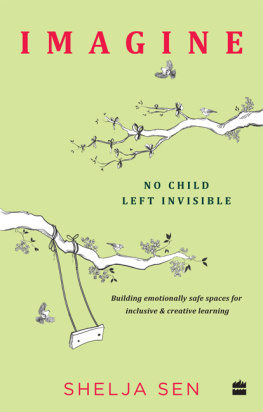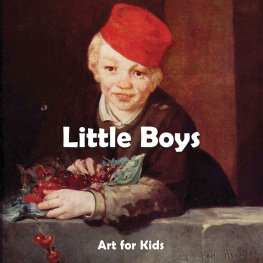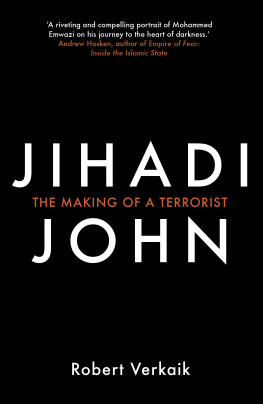
ABOUT THE AUTHOR
Robert Verkaik is an author and journalist specialising in extremism and education. He writes for the Guardian, Independent, the i , Observer , Sunday Telegraph and Sunday Times . In 2013 he was runner-up in the specialist journalist category at the National Press Awards and he has previously been longlisted for the Orwell Prize and the Paul Foot Award. Before becoming a freelance journalist, he was the security editor for the Mail on Sunday and the home affairs editor and law editor for the Independent , where he worked for twelve years.
Since the 9/11 attacks, Verkaik has covered the War on Terror, visiting the US detention camp at Guantnamo Bay and interviewing victims of torture in Syria. He has also headed media campaigns against secret justice and in support of greater press freedoms. More recently he has been writing about the causes of extremism and social immobility. In 2016 he tracked Mohammed Emwazis path from London schoolboy to Islamic State executioner in Jihadi John: The Making of a Terrorist , which is also published by Oneworld.
As well as being a journalist, Verkaik is a qualified non-practising barrister, called to Bar in 2007. He lives in Surrey.
Did you go to school?
The question asked of suspected
Old Etonians by Old Etonians
CONTENTS
British playwright Alan Bennett first arrived at Cambridge University in 1951, fresh out of Leeds Grammar School. His most striking memory of his Oxbridge experience was not the colleges historic architecture or even the warm greetings from the avuncular dons. No, Bennetts abiding memory is his first unhappy encounters with something he had never met before a public schoolboy.
On his return to Cambridge in 2014, Bennett was still irritated and angry at what he witnessed sixty-three years earlier. Speaking to an audience tightly squeezed into Kings College Chapel, he not so fondly recalled:
If the Dons were genial, some of my fellow candidates were less so. That weekend was the first time I had come across public-schoolboys in the mass, and I was appalled. They were loud, self-confident, and all seemed to know one another, shouting down the table to prove it, while also being shockingly greedy. Public-school they might be but they were louts. Seated at long refectory tables beneath the mellow portraits of Tudor and Stuart grandees, neat, timorous and genteel we grammar-schoolboys were the interlopers; these slobs, as they seemed to me, the party in possession.
In March 2016, an unnamed undergraduate writing in Oxford Universitys student newspaper Cherwell gives an uncannily similar description of his own encounters with public school alumni. Going to Oxford University from an inner-city comprehensive school, he wrote, is like living on another planet, one populated by strange people in bow ties with no concept of what its like to live in the real world People seem surprised in Freshers week that you havent met their mate Tarquin from St Pauls, or you didnt know about Humphrey from Etons gap year excursions in Goa. The student continues:
this public school network is real, and it affects your life as a student from a state school. Oxfords famous drinking societies are where this network comes into its element. The most famous of all is the Bullingdon, but Keble College have the dissolved Steamers, whose misogynistic antics arguably earned the college the chant: We are Keble, we hate women. Theres nothing wrong with a couple of lads going out for a meal, but when these lads all went to public schools, and meet in an all-male dining club, it projects an image of exclusivity that the university is keen to distance itself from. Yet this exclusivity is real, and is perpetuated by the students themselves, dishing out invites only to those who went to the top public schools, leaving those who were not fortunate enough to attend searching for where we fit in this posh puzzle.
Britains public schools started life in medieval times as schools for the poor. Closely tied to the church, they found favour as institutions of social mobility which took bright and pious children from their local community to the government of England. But they soon became victims of their own success, hijacked first by the aristocracy and then the merchant middle classes, who had profited so handsomely from the countrys industrial revolution. A premier league of private schools, which educated fewer than 3,000 boys, became the academy of the ruling elite which ruled an empire and waged and won two world wars.
Even as Britain faced its darkest hour, George Orwell urged action against the public schools, saying: It is all too obvious that our talk of defending democracy is nonsense while it is a mere accident of birth that decides whether a gifted child shall or shall not get the education it deserves.
Imagine a world where all the leaders of that world are able to pass on their power directly to their children. These children are plucked from their nurseries and sent to beautiful buildings far away from all the other children. Here they are given all the codes and taught all the skills they will need to wield their parents power and protect it for their own children. They are provided with all the teachers they need, the best buildings, the best doctors and the best food. They are introduced to the greatest thinkers and allowed to see and touch the finest art. Each day the children are told that the reason they are here is because they are the brightest and most important children in the world.
Before they are returned to society they are shown how to use secret languages and how to recognise the expressions, manners and countenances of their tribe. To make it easier they are also equipped with a uniform of brogues, blazers and badges. In the outside world they are presented with the best jobs, the grandest houses and most of the money. Through their networks of friends and family they control the government, the army, the police and the City. The leaders tell all their people that everyone is equal and that everyone has the chance of becoming a leader. But this isnt true because the leaders have made it impossible for the peoples children to become leaders.
Today all the great institutions of state government, judiciary and military are run by an elite who have attended private schools. The bankers, hedge-fund managers and financiers who control the money markets in the City went to these schools. Our professions continue to be dominated by privately educated doctors, lawyers and accountants. And the same is true of the countrys fourth great estate, the national newspapers and broadcasters which set the political weather.
The figures speak for themselves. Only 7 per cent of the population attend a private school. Yet private school pupils represent 74 per cent of senior judges, 71 per cent of senior officers in the armed forces, 67 per cent of Oscar winners, 55 per cent of permanent secretaries in Whitehall, 50 per cent of Cabinet ministers and members of the House of Lords, and a third of Russell Group university vice-chancellors.
Other influential sections of society are similarly affected. Nearly half (44 per cent) of the captains of industry and businessmen and women on the Sunday Times Rich List attended public school. Following closely behind are 43 per cent of newspaper columnists, 36 per cent of cabinet ministers, 33 per cent of MPs and 22 per cent of shadow cabinet ministers. Eton College educated more MPs (twenty) than any other school.

